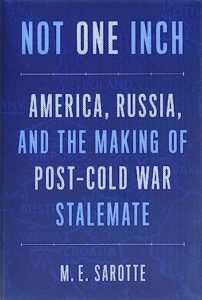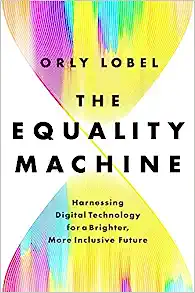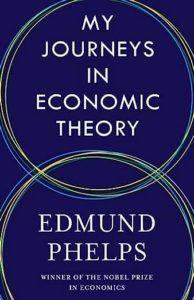Published
Summer Reading 2023 – Book Recommendations from ECIPE
By: Fredrik Erixon
Subjects: Digital Economy Far-East North-America Russia & Eurasia

Not One Inch: America, Russia, and the Making of Post-Cold War Stalemate by Mary Elise Sarotte
 Professor Sarotte’s book is necessary reading to understand one of the most controversial diplomatic and military endeavors of the late 20th century: NATO’s eastward expansion. Published just few months before Russia’s invasion to Ukraine, Sarotte’s fascinating and engaging recollection of events, discussions and meetings between Western leaders and their Soviet – and later Russian – counterparts, make this book extremely timely for understanding the complexity behind one of the greatest tragedies of the early 21st century: the war in Ukraine. A very well documented piece which relies on a vast quantity of primary sources, Sarotte points to different factors that helped or hindered the building of a new world order. U.S.-Russia relations were warm just after the fall of the Berlin Wall, but that moment quickly faded. Perhaps the U.S. and Russia were never meant to become close friends, as many would have wished. But there was nothing inevitable that would make them enemies. Just as there is nothing inevitable about going to war. According to Sarotte, the choices of individuals help to shape history.
Professor Sarotte’s book is necessary reading to understand one of the most controversial diplomatic and military endeavors of the late 20th century: NATO’s eastward expansion. Published just few months before Russia’s invasion to Ukraine, Sarotte’s fascinating and engaging recollection of events, discussions and meetings between Western leaders and their Soviet – and later Russian – counterparts, make this book extremely timely for understanding the complexity behind one of the greatest tragedies of the early 21st century: the war in Ukraine. A very well documented piece which relies on a vast quantity of primary sources, Sarotte points to different factors that helped or hindered the building of a new world order. U.S.-Russia relations were warm just after the fall of the Berlin Wall, but that moment quickly faded. Perhaps the U.S. and Russia were never meant to become close friends, as many would have wished. But there was nothing inevitable that would make them enemies. Just as there is nothing inevitable about going to war. According to Sarotte, the choices of individuals help to shape history.
The Equality Machine: Harnessing Digital Technology for a Brighter, More Inclusive Future by Orly Lobel
 Fight fire with fire, a song by Metallica and a sentence that captures the essence of this excellent book by Orly Lobel, a professor of law at the University of San Diego. In her book, Orly puts forward a forceful – and well-researched – argumentation in favour of Artificial Intelligence as a tool to tackle biases in decision-making: from hiring someone to swiping right or left. Algorithms can discriminate because they are built upon data that is biased (and human made). AI can be used to tackle these biases and make these decisions fairer. In a time when most policy-makers look at AI with a mix of fear and mistrust, this book offers lemonade to policy-makers lemons. Drink it over the summer.
Fight fire with fire, a song by Metallica and a sentence that captures the essence of this excellent book by Orly Lobel, a professor of law at the University of San Diego. In her book, Orly puts forward a forceful – and well-researched – argumentation in favour of Artificial Intelligence as a tool to tackle biases in decision-making: from hiring someone to swiping right or left. Algorithms can discriminate because they are built upon data that is biased (and human made). AI can be used to tackle these biases and make these decisions fairer. In a time when most policy-makers look at AI with a mix of fear and mistrust, this book offers lemonade to policy-makers lemons. Drink it over the summer.
My Journeys in Economic Theory, by Edmund Phelps
 Ed Phelps is a well-known economist – he received the Nobel prize in economics in 2006 – who has helped to shape the modern understanding of economic development and policy. In this short memoir, he walks us through his life and the thinking behind his biggest works – all in a non-technical way and with an eye for the human effects of the economy. While he started out trying to connect micro and macro economics, he later opened up a new understanding of trade-offs between inflation and unemployment. That matured into a theory of structural economic slumps – a theme that has become central for understanding the West’s hidebound economic performance. He also covers innovation and long-term economic growth, and what is necessary for a society of mass-flourishing. Schumpeter, Keynes, Hayek and many more modern economists feature prominently in the book.
Ed Phelps is a well-known economist – he received the Nobel prize in economics in 2006 – who has helped to shape the modern understanding of economic development and policy. In this short memoir, he walks us through his life and the thinking behind his biggest works – all in a non-technical way and with an eye for the human effects of the economy. While he started out trying to connect micro and macro economics, he later opened up a new understanding of trade-offs between inflation and unemployment. That matured into a theory of structural economic slumps – a theme that has become central for understanding the West’s hidebound economic performance. He also covers innovation and long-term economic growth, and what is necessary for a society of mass-flourishing. Schumpeter, Keynes, Hayek and many more modern economists feature prominently in the book.
Plato Goes to China: The Greek Classics and Chinese Nationalism, by Shadi Bartsch
 Plato and the other ancient philosophers are foundational for Western thought. But how have they been read, understood and used in China? In this fascinating book, Bartsch takes the readers through several phases of Chinese studies and uses of Plato and the ancient writers. While there is a brewing academic field in China studying the classics and Hellenism, modern uses of their thoughts remain influenced by the Westerners who introduced them to China and is often used in a political way. Now, Plato is a good assistant to understand Chinese nationalism.
Plato and the other ancient philosophers are foundational for Western thought. But how have they been read, understood and used in China? In this fascinating book, Bartsch takes the readers through several phases of Chinese studies and uses of Plato and the ancient writers. While there is a brewing academic field in China studying the classics and Hellenism, modern uses of their thoughts remain influenced by the Westerners who introduced them to China and is often used in a political way. Now, Plato is a good assistant to understand Chinese nationalism.